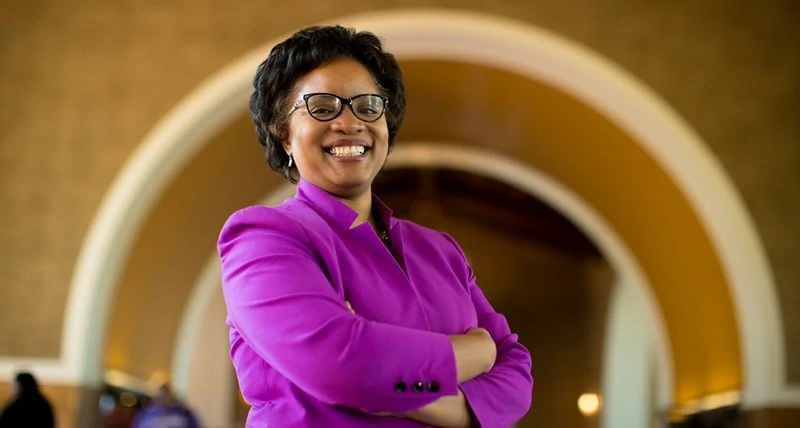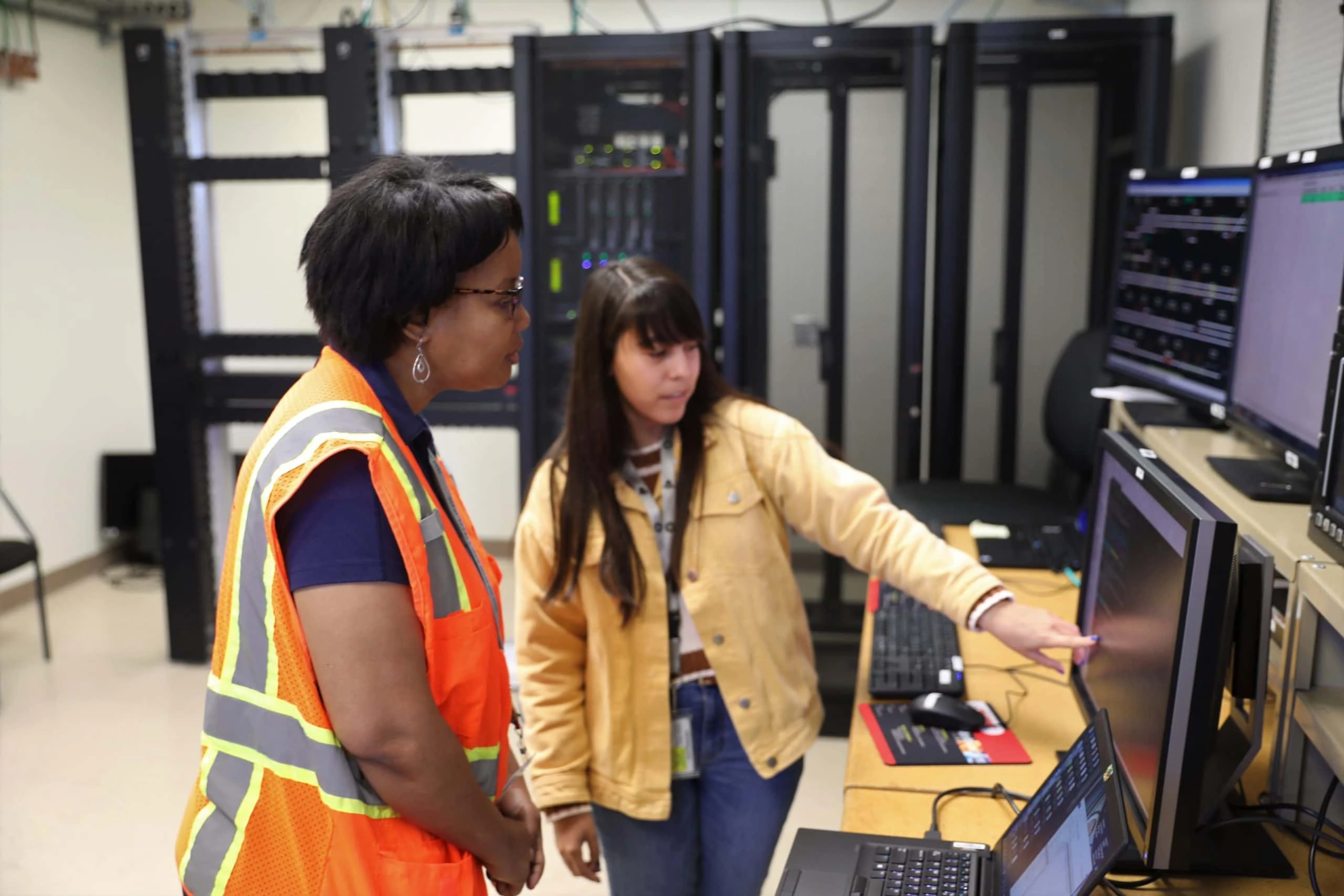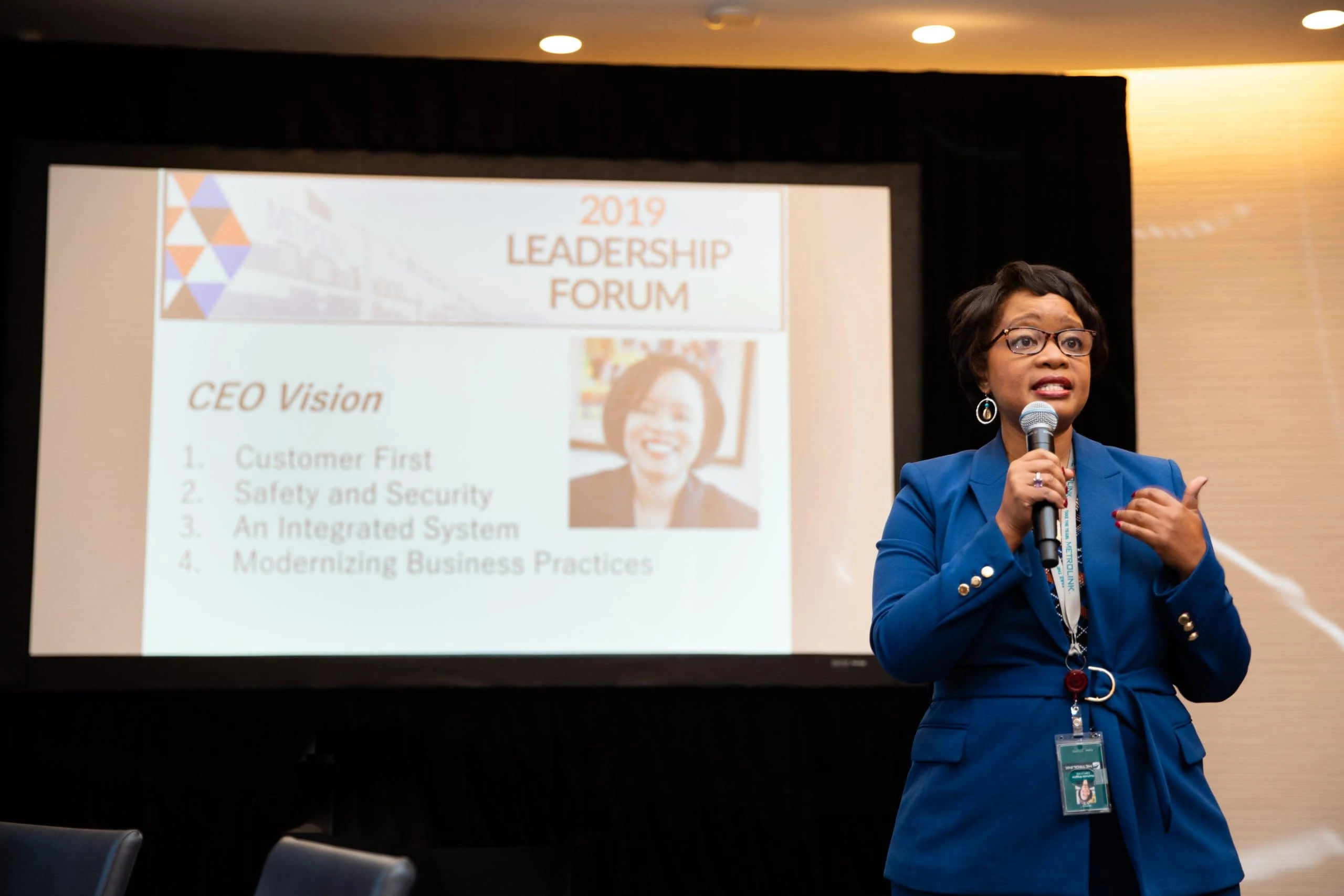The Point: RCTC tracks the career of Stephanie Wiggins, who explains how transit can be a catalyst for equity
Stephanie Wiggins once walked the halls of RCTC, helping to plan our region’s transportation future. Years later, she took on important roles at LA Metro, including Deputy Chief Executive Officer. Wiggins was appointed as Metrolink’s Chief Executive Officer in 2018. She is the first African American and the first woman to lead the region’s commuter rail agency.
During her time at Metrolink, she has received multiple commendations, including the American Society of Civil Engineers Excellence in Engineering 2020 award and the League of Railway Women 2020 Woman of the Year.
Under her leadership, Metrolink experienced its highest ridership in 2019 with 12 million passenger boardings while making strides to reduce greenhouse gases with the retirement of all high emission locomotives from the fleet. When the COVID-19 pandemic struck, Wiggins sprang into action and helped implement policies to ensure the health and safety of essential workers, who depend on the commuter rail system. Wiggins took a few moments to reflect on her transportation career while sharing her views on justice and equity.
1 – Describe your career path and the steps you took to reach the C-suite at Metrolink.
It’s hard to believe that I’m in my 27th year in this industry! And I was introduced to transportation somewhat by accident. A couple of years after graduating from Whittier College here in Southern California, I took a temporary summer job at San Bernardino Associated Governments (now the San Bernardino County Transportation Authority) to save for grad school.
Transportation as public policy was all new to me. SANBAG was a relatively small organization controlling hundreds of millions of dollars in public funds. I was intrigued, so I accepted a job in the finance department and stayed for four years. Then I was offered a program analyst position with you at RCTC. I held various management positions there. After a few years at RCTC, I also received my MBA from University of Southern California, while working full-time.

Shortly after I left RCTC, I joined the Los Angeles County Metropolitan Transportation Authority – LA Metro – where I was assigned to oversee the massive, high-visibility Metro Express Lanes capital project to help combat freeway congestion – a very controversial project. We were able to tap into the pent-up demand of people who were willing to pay for time-saved, while helping alleviate congestion, and after five years (with the help of one of your very own, Jennifer Crosson), we successfully launched the initiative on the 110 in late 2012 and on the 10 in early 2013. The project was unique because it does not rely on a public subsidy to fund operations and maintenance, so it provided a new funding stream to LA Metro.
The success of the Express Lanes created new opportunities internally at LA Metro. I was promoted to the Executive Director of Vendor/Contract Management, a department of almost 300 staff members. In this role I engaged with the entire agency, as well as increased engagement with the private sector. It was one of the best career moves I’ve ever made because it taught me the “business of the business.”
The next opportunity was the role of Deputy CEO at LA Metro, where I championed the first ever Women and Girls Initiative for the agency and helped usher in the largest sales tax initiative in the agency’s history, Measure M.
Every experience prepares you for the next. Armed with experience, having worked at three of the five member agencies of Metrolink, I became the first female and African American CEO in 2019.

2 – During your career, have you benefited from a mentor?
Throughout my career, there were people who helped pave my path to the CEO Suite. They encouraged me when I had doubts, and reinforced that anything I wanted was possible.
Their support, wisdom and kindness helped empower me to succeed and enriched me with knowledge that I couldn’t find in a book or classroom. My mother, who had a 10th grade education, pushed me to succeed—and let me know that because I was a woman of color, I’d have to work even harder at it.
I’ve had my own “kitchen cabinet” of women who have helped me along the way, including your executive director, Anne Mayer, who has given me advice at critical times during my career.
3 – As our nation faces social injustices, what do you see as your role as the Metrolink CEO in bringing about change?
The pandemic has brought social injustice out of the shadows, where it has lurked for so long, and now agencies can’t ignore issues of inequity any longer. In transportation we have such a big role to play in addressing issues like health disparity, sustainability, and universal mobility.
But to see a paradigm shift, we must be intentional in our approach. And given that these are emotionally charged topics, we need to look at data to identify where inequities exist and how to solve problems with informed decisions. Then we need to disaggregate that data so we can have a clearer perspective around the nuances among cultures whose needs vary. Inviting the community into that conversation can be very powerful. We must be transparent, acknowledge our mistakes of the past, and clear about expectations.
4 – How can women succeed in the transportation industry and hold more leadership positions?
Gender diversity in the executive ranks is so important in transportation. Historically, women have struggled to find a way to fully flourish in our industry. But their long-fought efforts to step into the roles that once were only filled by men have made it possible for us to find a place for ourselves today.
We need to really put a magnifying glass at executive hiring practices.

That means empowering human resources teams to look at the fine print of legacy hiring policies and job descriptions that may unintentionally exclude women and not give everyone a fair opportunity.
We should also make sure we have women sitting on our boards. So many studies point to how having more women in top leadership positions at organizations directly correlates to higher profitability for the bottom line.
I advocate also for creating a platform for open discussion with employees to give people real insight into challenges women and people of color face in a white, male-dominated industry.
5 – It can be lonely at the top. How do you stay connected with your staff, friends, and family?
Early in the pandemic, I established virtual coffee breaks to maintain a connection with employees as we worked from home. These are 30-minutes when I get together three times a week virtually with employees and learn more about each other as human beings.
These get-togethers create an environment where everyone is invited to contribute in their unique, meaningful way and feel safe and secure doing so. During the summer, they helped us process what was taking place around us– all the critical equity issues that the demonstrations brought to light—and really helped us crystallize our cultural values of diversity, inclusion, and belonging. We have had meaningful conversations about those topics and discussed what place we wanted this to be. I am so proud of this effort and happy to have forged such strong connections with my staff – the people who move people.
